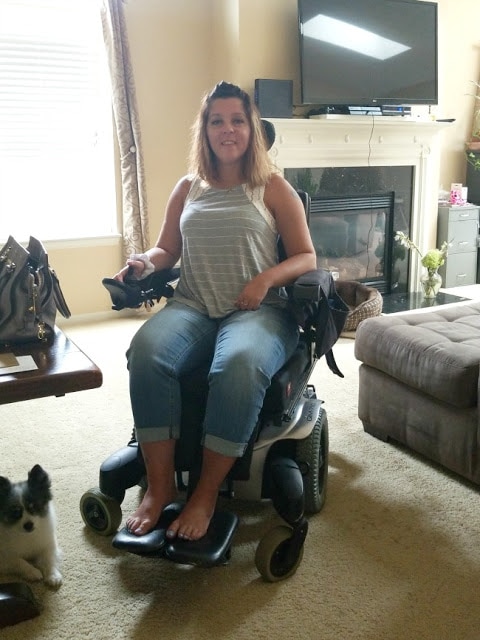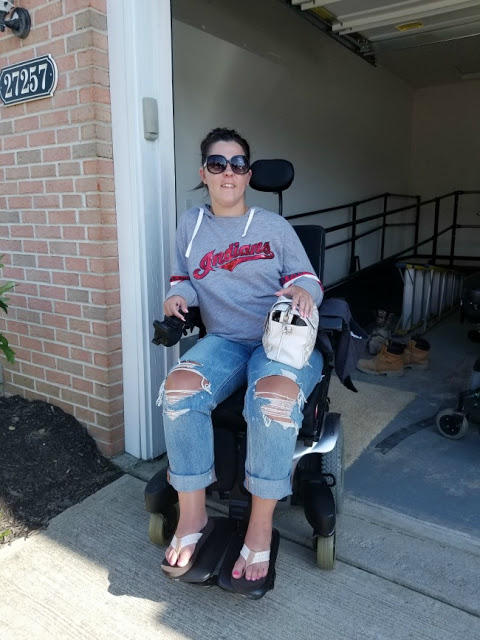Miggy: Hi Jackie and welcome! Thank you so much for sharing your story here on TLM today. Let’s start at the beginning, how old were you when your parents first knew something wasn’t quite “right” with you? How old were you when you started to notice you were different from other kids and how did that make you feel?
Jacqueline: When I was born I was what is known as a “floppy” baby. I had very low muscle tone, and a weak cry. As the months went on my parents knew something was very wrong because I was not hitting milestones like I should have been. When I was almost 3 years old my parents took me to the Cleveland Clinic where I had a muscle biopsy done and was formerly diagnosed. My parents have each shared with me how devastating it was to hear that there was no treatment or cure for my disease. Doctors back then didn’t know as much about my disease back then. They thought I would have progressed quicker and been very weak by my teenage years. I was able to maintain decent strength until my 20s and then things just kept getting harder to do. I remember realizing I was very different from my peers in elementary school. Kids would ask me if I was “retarded” because I walked funny and couldn’t participate in gym class. In the early ’80s public schools really segregated the disabled kids, which made me feel so horrible. How could I possibly fit in with my peers when they kept me separated from them?
Miggy: I’d love to hear about your family life growing up. Were your parents supportive and if so, in what ways did they encourage and support you? Do you have siblings? If so how was your relationship to them growing up? Is there something your parents did really, really well for you as a child? Is there anything you wish they would have done differently?
Jacqueline: My family is the most supportive group I have ever met!! My Mom always treated me as though I was a perfectly “normal” child. She encouraged me to try anything that I was interested in, and let me do all the typical things a child would growing up, like driving and dating and getting a job. My Dad was a little more apprehensive when it came to letting me explore life. I feel like he was nervous for his only daughter, and that he really wanted to protect me and shelter me from being hurt. Together my parents were the perfect combo when it came to raising a special needs child. I have a younger brother and he simply rocks! We were very much a typical brother/sister duo in our younger years…arguing and picking on each other, many times with my Dad intervening when it would get physical. Once we hit our teenage years we became the best of friends. He went everywhere with me and helped me with everything I struggled with physically on a day-to-day basis.
Miggy: Having a daughter with a power chair we have quickly learned that the world is not accessible! As a disabled adult what is your day-to-day like? Is accessibility a struggle in your daily life? In short, what do you want able-bodied people like myself to understand about the importance of accessibility?
Jacqueline: Ahhhh, accessibility. Right now I am at a point where I can no longer walk, so I use a power wheelchair everyday. We do not have a vehicle that I can get into with my chair, so I have a manual chair that we use when I leave the house. It is horrible. I HATE using the manual chair. It drives me crazy to have someone else in control of which way I go, or what direction I am facing. I advise parents to invest in a van that will carry your child in their powerchair. Independence is just so very important to creating ones personality! Growing up I was stubborn and would not use a wheelchair, and I suffered for it, I believe. I struggled to walk, climb stairs, everything. If I had just not been so proud and just used the help I feel like my early childhood could have been a little easier.

Miggy: Living with a visible disability–ie being a wheelchair user–has unique challenges, in an ideal world how would you like people to approach and/or respond to you? Is there something you wish other people knew so as to avoid awkward or hurtful situations?
Jacqueline: It’s funny how able bodied people are just so quick to forget that we disabled people are not so different from them. I am so many things in life, and disabled is at the bottom of the list… I am a mother, a daughter, an animal lover, a domestic violence survivor, a former single mother to 2 daughters, a strong woman. I just do things a little differently than others, and that’s ok.
Miggy: Now for a lighter question, I’m a big believer in seeing the humor in life and learning to laugh, so have you ever had any funny conversations/moments you never imagined due to your special needs situations?
Jacqueline: Humor is so important in my family. It is how we process and deal with day to day struggles. If we didn’t laugh, we would probably be crying, and who wants to live like that?! You have to be able to laugh at yourself…and then shake off whatever it was and keep moving.
.jpeg)
Miggy: Lastly, if you could give an individual or a family going through a similar journey as your own, what advice would you give? Is there anything else you want people to know about you, your life or disability in general?
Jacqueline: If I could give parents any advice, it would be to teach your child early on about their condition. Work to make your home as accessible as possible. Let your child have fun. Let your child have some say in what therapies they like/dislike. Be thankful for the small things.
As always if you or someone you know would like to participate in the special needs spotlight please email me at thislittlemiggy at gmail dot com.
Have a great weekend and be safe Florida. Still thinking of you Houston.
XO,
Miggy



